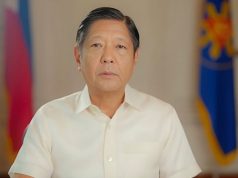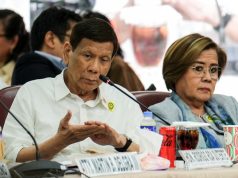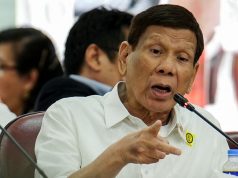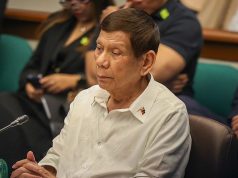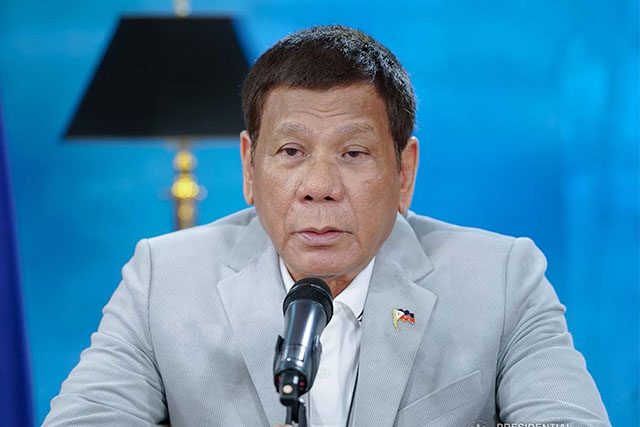
Some Filipinos stressed that they do not expect President Rodrigo Duterte to personally rescue victims of Typhoon Ulysses (international name “Vamco”) on his own after he addressed concerns on his perceived lack of public presence as the tropical cyclone raged over Luzon.
The chief executive on Thursday afternoon delivered a six-minute taped speech where he defended his absence amid Ulysses’ onslaught and said that he was told to prioritize his safety as the top official of the country.
Duterte’s speech was aired after he virtually attended the opening of the 37th Association of Southeast Asian Nations Summit that would be held from November 12 to 15, 2020 through video conference.
He commented on wanting to “swim” with the victims of the typhoon to supposedly share their agony but added that he was prohibited by various people surrounding him.
“Ganito kasi, ‘yan ang problema ko. Binabawalan ako nang nagbabantay sa akin, PSG (Presidential Security Group) lahat, doktor. Hindi ako makalabas. Sabi ko naman na gusto kong magpakita sa tao (man lang). Ang sabi nila nga, bantayan ‘yung pagkatao ko kasi ako ‘yung Presidente,” Duterte said.
“Sabi ko, ‘Hindi na bale, tutal mayroon namang Vice President, kaya nga mayroon ‘yang position na ‘yan eh.’ Eh ang sabi naman is, ‘Marami ho ang official sa labas. Isa lang ang Presidente.’ Gusto ko. Kung sabihin mo lang as a concern for buhay o kapakanan, wala ako diyan,” he added.
“Gusto kong lumabas, gusto kong lumangoy. Matagal na ako hindi naligo eh. Kaya lang ayaw nitong mga sundalo. Sila ang ayaw gustong maligo, ibig sabihin. So ganoon ho ang sitwasyon. It’s not that I am at a distance from you na may distansya ako ngayon sa inyo,” Duterte further said.
He also assured the public that the government is “on top of the situation” and that various agencies “have already been mobilized to respond to the situation on the ground.”
But, Duterte’s comments did not amuse some social media users who continuously pointed out that they do not expect him to swim in the floodwaters to show that he was proactively addressing the crisis.
“Oh (come on), #NasaanAngPangulo isn’t about you personally rescuing victims, stopping the typhoon. It’s about assuring your country that you’re actually WORKING to help us. IT’S YOUR RESPONSIBILITY. That’s why we demand accountability,” artist Kerwin King tweeted.
“We don’t need to take this literally, sir. What they need the most are rescuers, boats and the likes. ASEAN meeting is not on your priority list, sir. The victims of the typhoon are really in need of help from authorities. Prioritization is a must,” wrote another online user.
“All you have to do is give them what they need. Rescuers ang hinihiling. It’s not even necessary na ikaw ‘yung lumangoy sa baha,” another Filipino responded to Duterte’s recorded remarks.
“No one’s blaming the government for the fact that there’s a storm. It’s their lack of disaster management, response, mitigation and preparedness that’s being pointed out here. #NasaanAngPangulo,” a Twitter user said, using the hashtag that has spurred Duterte to address his critics.
Another online user likewise shared a similar observation under the hashtag that has been trending amid Ulysses’ onslaught in Metro Manila and other regions.
Parang ang daming matic na bagay na expect natin sa leader pero wala tayong nakita
.
Bago magkaroon ng bagyo, sana na address ang lahat. Nagamit yung emergency powers for calamity. Mas na ensure yung movement ng Responders. Etc.
.
Kaya siguro nag trend yung #NasaanAngPangulo.— Gelo Arellano (@gelobeans91) November 12, 2020
‘Sign of leadership’
Last night, critics of the president tweeted the hashtag as Ulysses made its way to the Quezon Province, CALABARZON and Metro Manila with destructive winds and heavy rainfall that triggered widespread flooding.
RELATED: Typhoon Ulysses lashes Luzon, kills one
“#NasaanAngPangulo” continuously topped the local trending list of Twitter by Thursday as Filipinos demanded for Duterte’s public presence amid the typhoon’s onslaught that has also affected Central Luzon.
RELATED: Widespread flooding during ‘Ulysses’ onslaught triggers memories of 2009’s ‘Ondoy’
When we demand for accountability, stop calling it bashing. When we ask #NasaanAngPangulo — it’s not cause he can stop natural disasters but because he has the POWER and AUTHORITY to help the people he’s supposedly in charge for. Instead we get nothing, no word.
— my pearl, goddess divine, mrs. darcy (@awitchyaffair) November 11, 2020
#NasaanAngPangulo trend doesn't mean that the president needs to stop directly the storm but we need the presence of his leadership, to care, to protect, and to help his people.
Remember, In a time of crisis presence is a sign of leadership. Absence is an abandonment of duty.
— Brrrrrrrrtt Brrrrtttt?? (@SirRencee) November 11, 2020
Actions
After Duterte’s taped speech to the public was broadcasted, pictures of him conducting an aerial inspection with a lawmaker surfaced.
The chief executive assessed areas heavily affected by the typhoon such as Marikina and parts of Rizal Province.
Photos of some of the Palace grounds where Duterte was staying were also released which featured water from the Pasig River seeping through as effects of the typhoon.
Duterte likewise claimed in his speech that the government did not sleep through the night as Ulysses wreaked havoc in the metro and parts of Luzon.
“Iyon pa lang ‘yung dumating ang advisory sa atin, nakapondo na ‘yung mga tao. The goods are there, the people have been mobilized and deployed, kaya pagdating ng bagyo nandiyan, nagtrabaho na sila. Kaya may magsabi na walang ginawa, natutulog, wala kaming tulog dito,” he said.
This was not the first time that the “#NasaanAngPangulo” hashtag trended during an onslaught of a natural disaster.
It also surfaced when Duterte’s lack of presence during the first high-level briefing of public officials about Super Typhoon Rolly was noticed.
“Rolly” is considered the world’s strongest tropical cyclone in 2020 so far.
RELATED: Throwback to Duterte’s ‘Yolanda’ efforts amid absence during ‘Rolly’
Communication in crisis
Experts note that it is important for leaders to over-communicate in times of crisis and to be “present” and “tangible.”
“What leaders really have to do in times of crisis is to over-communicate. People in times of crisis are afraid. They’re anxious, they feel fear, they need to be reassured. In these times, it is very important for the leader to be present, to be there, to be tangible,” Professor Katharina Balazs of ESCP Business School said in a video.
“And even though leaders themselves often don’t know what exactly is going on, they need to give us that much contextual information as possible to people. They need to address fears and anxieties and to prevent speculations and rumors, which very quickly come up when communication is not done,” she added.





